
Image for representation.
Credit: iStock Photo
After 20 years of deliberations on Genetically Modified Organisms (GMOs), a two-judge bench of the Supreme Court of India recently delivered a split verdict, with several areas of agreement and one of divergence. Consumers closely following the case have welcomed the consensus on the need for a sound policy formulation process but are concerned about how this process will be conducted in practice. Consumers worldwide have long opposed GM crops, and now India’s farmers are joining them.
On August 22 in Chandigarh, leading farmer union leaders passed a resolution stating that GMOs in farming are “unneeded, unsafe, and unwanted,” accusing them of being based on “false promises to capture and control our farming systems”. They emphasised that their resolution applies to all GM crops, including those developed by the public sector, such as GM mustard and genome editing. The road ahead is crucial for all of us.
History of GM Crops in India
Since 2004, the courts have heard several cases concerning GM crops. In 2013, a Supreme Court-appointed Technical Expert Committee (TEC) of five eminent independent scientists unanimously found the approval process for GM crops in India to be seriously flawed. They noted that biosafety tests were conducted by the GM promoters themselves rather than by an independent agency, and that the trials were of inadequate duration and lacked proof of safety. A sixth expert, whose inclusion was challenged due to a conflict of interest, took a different view.
The independent TEC members deemed herbicide-tolerant (HT) crops unsuitable for India, citing health risks and the potential destruction of the weeding income of millions of poor women. To their credit, two Parliamentary Standing Committees in 2013 and 2017, setting aside political agendas, unanimously expressed concerns, and held against open-air GM field trials. One committee even called for an umbrella biosafety protection legislation for India.
Based on the perceived negative effects, these committees recommended that India adopt the Precautionary Principle followed by most countries. (Notably, even after 30 years of commercialisation, only five countries account for 91 per cent of GM crop cultivation, while over 165 countries reject GM cultivation.)
A GM Policy
The two-judge bench directed that the Ministry of Environment, Forest and Climate Change (MoEF&CC) must “evolve a national policy with regard to GM crops in the realm of research, cultivation, trade, and commerce in the country. The said national policy shall be formulated in consultation with all stakeholders, such as experts in the field of agriculture, biotechnology, state governments, representatives of the farmers, etc., and for the aforesaid purpose, the MoEF&CC shall conduct a national consultation, preferably within the next four months”.
In fact, a policy that was drafted by the Task Force on Application of Biotechnology in Agriculture, headed by M S Swaminathan and adopted by the Government of India in 2004, has not yet been used in direction-setting for regulatory decision-making. For instance, this Task Force clearly recommended that transgenic options should not be thought of in crops for which we are the Centre of Origin/Diversity; it also recommended against herbicide-tolerant crops in India.
It said transgenics should be thought of only as a last resort. Since then, there has been even greater cause for concern and caution. Currently, 99% of GM crops either have a pesticide in every cell (Bt) or facilitate spraying of an herbicide (88 per cent are HT). Over 150,000 cases have been filed in the United States for cancers caused by glyphosate, the herbicide used with most HT crops. Bayer, who now owns Monsanto, has paid $11 billion so far to settle 100,000 of these cases. Brazil reports serious damage to children’s health. A biosafety policy on GM is vital. It is now for MoEF&CC to make the consultation process a genuine, open-minded learning for all and not a meaningless gesture of compliance with the Supreme Court directive.
In 2010, consultations were initiated suo moto by the then Environment Minister, Jairam Ramesh, regarding commercial cultivation permission for Bt brinjal. Personally, having spent over 30 years on environment and sustainable development issues, I had welcomed the GM industry claims of higher yield with lower pesticides until this consultative process made available a wealth of data.
The views of scientists, farmers, environmentalists, medical professionals, and concerned citizens were systematically sought and transparently shared. The uploading of all the biosafety studies gave an opportunity for peer review by other scientists. This multi-dimensional and transparent assessment eventually led to a moratorium on the release of Bt Brinjal.
It is for the present Minister for Environment, Forests, and Climate Change to ensure that under his leadership too, the mandate given by the honourable judges for formulation of a much-needed GM policy will be based on a genuine, transparent, and widespread consultation with all stakeholders. It is important that the policy on GM crops should actually be set within a Biosafety Protection framework. This is of vital importance for consumers, farmers, ecosystems, seed, and food sovereignty—in fact, for every citizen today and for future generations too.
(The writer was Chair of the Working Group on the Ecological Foundations for Sustainable Agriculture, Govt of Maharashtra)